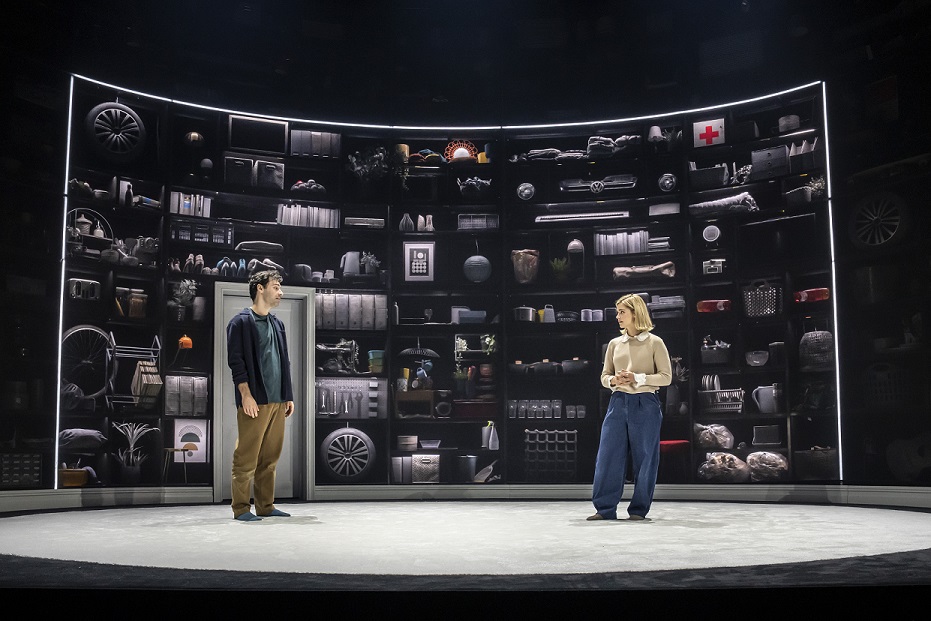Lemons Lemons Lemons Lemons Lemons
Sam Steiner’s two hander is certainly stimulating, thought provoking and undoubtedly challenging. It poses an idea, somewhat Orwellian, of a point at some unspecified time where a controlling power decrees that everyone has a limited number of words that they can use in a given day. Oliver and Bernadette have met at a pet cemetery for the funeral of a cat whether that has any real relevance is somewhat unclear. But that is the root of their oddly unbalanced relationship, a pairing that lurches from gentle intimacy to uneasy conflict. And that conflict is heightened when what they mean to say and often need to say is hampered by the rationed use of language.

Lemons Lemons Lemons Lemons Lemons by Sam Steiner, , Director – Josie Rourke, Designer – Robert Jones, Lighting – Aideen Malone, Harlod Pinter Theatre, London, 2023, Credit: Johan Persson/
Strangely the play never really explores or reveals who the power to make this ruling is, or in fact why. Nor does it explain how that ruling is policed, so you might believe that the power in place is so oppressive, so terrifying that the population comply without question.
That of course provokes so many questions about authoritarian society but also leaves so many unanswered too. It’s an uneasy watch, uncomfortable in many ways, staccato in pace, confusing in its distortion of time and visually distracting too.
The set is impressive and beautifully lit but elements of the design and the lighting are strange, the tracing lights at times clearly defining space or perhaps time, but at others seem intrusive and even irrelevant.
Aidan Turner and Jenna Coleman deliver the text with assured confidence. Turner is a musician and the less confident of the two characters, swallowing ideas and struggling to convey both his emotions, his past and his concerns about the restriction on language. Coleman is the more confident lawyer, facing the new rules with an air at times of entitlement, sure that her legal world of courtrooms will be declared exempt. The whole becomes a tale of class struggle and privilege and one that, as they face the restrictions, becomes harder for them to express and in turn for we the audience to comprehend, which I assume is the writer and directors’ intention.
It’s disquieting stuff for sure, a play that leaves one feeling unsettled, unsure of whether you have actually grasped what is important, and some hours later thinking that perhaps that was the full intention, sending us home feeling scared and uncomfortable.
Josie Rourke’s direction is sharp, rapid fire and in many ways stark, playing out in front of a monochrome backdrop of domestic ephemera with occasional hits of warmth and colour. Uncluttered action agains a cacophonous clutter of insignificant artefacts. It’s impressive in what it achieves in grounding the narrative without actually defining a time.
It’s beautifully staged, striking in many ways and a play and performance that I will not forget. Did I enjoy it? Well in part. Did I need to enjoy it? I’m not sure I did, it certainly made me think about language, relationships, oppression and class, but it also left me confused, filled with a sense of unanswered questions. I enjoyed it on many levels but I wanted to like it more.
Andrew Kay
Theatre Royal Brighton
28 March
Rating:





















